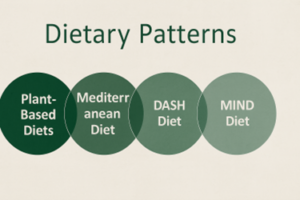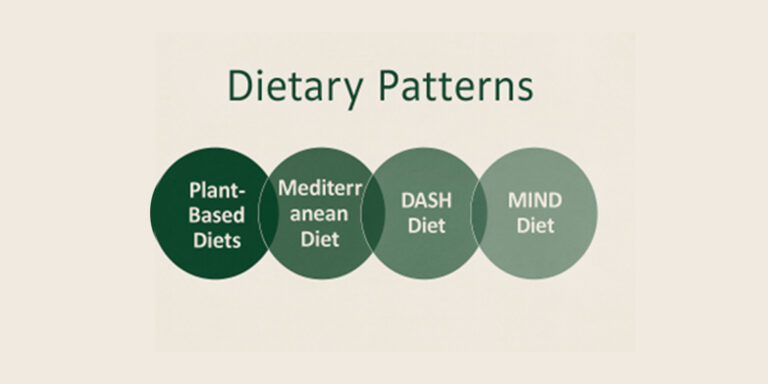Nutrition is becoming an increasingly important topic in modern sports medicine. It is essential to clearly distinguish between prevention and therapy.
In prevention, terms such as healthy lifestyle, balanced diet, or even healthy diet, plant-based diet, or Mediterranean diet (https://www.nejm.org/doi/full/10.1056/NEJMoa1800389) may suffice. They provide good general guidance and are scientifically proven – provided that everyone involved knows what is meant and understands the same thing.
However, when it comes to therapy, rehabilitation, or targeted support in the context of orthopedic and trauma surgery conditions/injuries, such a blanket recommendation is no longer sufficient; it will not be understood or implemented. Here, the focus must be clearly on the individual context of the patient or athlete—in the sense of targeted nutrition, supplemented by specific dietary patterns (see figure).

These provide structure and enable individualized, comprehensible application on one’s own responsibility, without directly overloading the individual with “stress.” Threat vs. motivation/reward (less is more information). The key point here is that malnutrition or nutritional deficiencies must be identified and eliminated. Without this foundation, nutritional therapy recommendations cannot be understood, accepted, or implemented. In addition, the individual’s own reward and motivation system may be ignored. See the article Mindfulness & Nutrition.
“Eating is a highly emotionally charged, social and cultural activity, conditioned and reinforced over an entire lifetime.”
— Jon Kabat-Zinn, Full Catastrophe Living
Therefore, dietary patterns can serve as a pleasant template and take this into account. Suitable, scientifically proven, and basic dietary patterns in prevention are also therapeutically useful and evidence-based in certain contexts, e.g.:
- Plant-based diet
- Mediterranean diet
- DASH diet (cardiological)
- MIND diet (neurodegenerative)
If this goes beyond that, a specific goal must be formulated:
- Is surgery planned?
- Is conservative treatment being used?
- Is the patient/athlete willing and able to go along with it (understanding/motivation)?
In this case, we recommend using a target-based dietary pattern including target nutrition if necessary (step 2), which is based on examinations, conversation content (motivational interview) and realistic and personal starting points. This promotes a high level of compliance at an early stage.
A current example of such a nutritional pattern, which is probably closest to a healthy, balanced diet, is the recommendation by Prof. Dr. Andreas Michalsen (FAZ, July 10, 2025), who recommends a diet rich in fiber (≥ 30 g/day) and polyphenols in combination with fermented foods for the prevention of chronic diseases, inflammation, and premature aging.
This anti-inflammatory diet includes:
This is also targeted nutrition with elements of traditional, natural nutrition – effective both in prevention and therapy.
Perioperative nutrition
Another innovative example is perioperative nutrition or prehabilitative nutrition, for example in disc surgery or cruciate ligament ruptures. In these cases, it is not enough to recommend general diets or even unspecified proteins or collagen. Instead, targeted doses of specific amino acids, enzymes, collagen peptides, polyphenols (see above) are required before, during, and after the operation, if necessary – see HERE – embedded in an overall inflammation-modulating concept such as a basic nutritional pattern (see above).
Dr. Petra Büchin, chief physician at the Center for Spinal Surgery and Back Therapy at the Karl-Olga-Hospital in Stuttgart, recommends, for example, that patients „who come to our spine center due to back problems also take dietary supplements, such as turmeric, boswellia, vitamin C, or omega-3 fatty acids to reduce oxidative stress.“ (Source: Why less oxidative stress also helps the intervertebral discs). See also the review article by Hao Zhou et al. in the Journal of Orthopaedic Translation (Volume 49, 2024) on oxidative stress.
For further analysis—such as laboratory parameters, microbiome diagnostics, or BIA—specialized nutritionists or dietitians are the right people to contact. However, surgeons, conservative orthopedists, therapists, and sports physicians in particular should now be able to answer nutrition-related questions competently, knowledgeably, and in a patient-oriented manner—instead of limiting themselves to general statements. After all, nutrition has long been part of holistic therapy and preventive medicine. See also the article “Prehabilitation of the anterior cruciate ligament” by Dr. Christina Valle, Dr. Robert Percy Marshall, and Dr. Natalie Mengis.
Particularly in elective procedures – for example, in the preoperative phase or as part of rehabilitative preparation – it is advisable to perform not only the Nutrition Risk Score but also a bioelectrical impedance analysis (BIA) as part of the nutritional assessment. This allows the early detection of impending malnutrition, which can otherwise significantly increase the risk of postoperative complications.
Further educational videos on this topic:
Prehabilitation of the anterior cruciate ligament – focus on nutrition
Tendons, pain, inflammation – regenerative therapies, co-therapy, training, and nutrition
Regeneration, performance, health: why our diet is essential
Autoren
ist Diplom-Sportwissenschaftler mit Professional Master’s Degree in Sports Medicine sowie postgradualen Weiterbildungen in Mind-Body-Medizin (Harvard Medical School), Psychoneuroimmunologie und Lifestyle Medicine (American College of Lifestyle Medicine); Verleger der sportärztezeitung.
is a certified sports scientist with a professional master's degree in sports medicine and postgraduate training in mind-body medicine (Harvard Medical School), psychoneuroimmunology, and lifestyle medicine (American College of Lifestyle Medicine); publisher of the sportärztezeitung.



